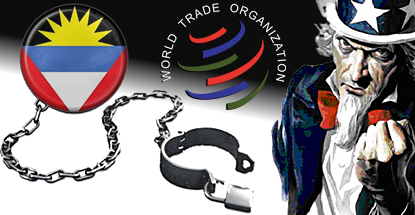 Antigua says its long-running effort to get the United States to observe World Trade Organization (WTO) rulings on online gambling underscores the fact that strong nations make their own global trade rules. On Friday, representatives from Dominica attended the most recent meeting of the WTO’s Dispute Settlement Body (DSB) in Geneva to read a statement on behalf of Antigua and Barbuda conveying their frustration at the US’ stonewalling on the online gambling issue.
Antigua says its long-running effort to get the United States to observe World Trade Organization (WTO) rulings on online gambling underscores the fact that strong nations make their own global trade rules. On Friday, representatives from Dominica attended the most recent meeting of the WTO’s Dispute Settlement Body (DSB) in Geneva to read a statement on behalf of Antigua and Barbuda conveying their frustration at the US’ stonewalling on the online gambling issue.
More than a decade ago, Antigua filed a WTO complaint over US efforts to prevent Antigua-licensed online gambling operators from serving US customers. The WTO upheld Antigua’s complaint and rejected subsequent efforts by the US to reverse the decision. However, the US has shown no willingness to pay Antigua the $21m in annual damages it was awarded in 2006, creating a total unpaid tab of around $150m (and growing). Given the US intransigence, the WTO authorized Antigua to collect these damages by other means, including offering royalty-free downloads of US intellectual property such as films, TV shows and music files.
As quoted by Intellectual Property Watch, Antigua’s statement to the DSB on Friday emphasized the David v. Goliath nature of this struggle, saying “this prolonged action by one of the weakest against the strongest” was giving ammunition to critics who believe the only truly binding global trade rule was might makes right. Failure to address the issue would leave the WTO looking like “a vehicle by which the strong economies could extract concessions from the weak while at the same time effectively stone-walling – no, in fairness, denying – the ability of small economies to obtain any meaningful recourse when wronged by others.”
Antigua has engaged in multiple negotiating sessions with the US to resolve this issue but has yet to receive any offer they deemed serious. Antigua has since come to the realization that “the major economies of the world do not have to face the same fears and uncertainties when they – as they have indeed done – make their own recourse to such remedies.”
The statement went on to detail US efforts to paint Antigua as the villain for looking to collect on its WTO-authorized damages. It’s been over a year since the DSB authorized Antigua to implement its digital download site, yet Antigua has shown remarkable restraint in pulling the trigger. But as Antigua prepares to implement “this remedy of last resort,” the US has made “public statements and pronouncements, accusations that if the Antiguan government were to actually impose the suspension of concessions, somehow Antigua and Barbuda would be the outliers here.”
Small wonder, then, that Antigua is left wondering: “just what does this dispute resolution process do for a country such as Antigua and Barbuda?”
